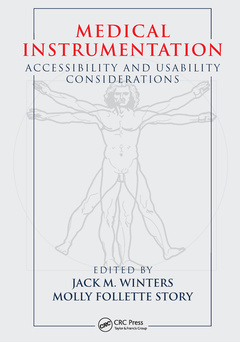Description
Medical Instrumentation
Accessibility and Usability Considerations
Coordinators: Winters Jack M., Story Molly Follette
Language: English
Subjects for Medical Instrumentation:
Keywords
Speech Language Pathologists; National Rehabilitation Hospital; accessibility measurement criteria; Acquired Brain Injury; home-based medical products; PDA Device; home care technologies; Universal Remote Console; medical device accessibility; Accessible Medical Instrumentation; Limited Motor Function; Rehabilitation Engineering Research Center; Medical Devices; PDA; Universal Design; Accessible Medical Devices; Medical Instrumentation; Medical Device Design; IMS Global Learn Consortium; Home Health Care Devices; Health Care Providers; Universal Design Strategies; Mobile Wireless Technologies; Usability Testing; Assistive Technology; Mri Machine; Human Technology Interfaces; Access Board; Examination Table
Publication date: 12-2019
· 17.8x25.4 cm · Paperback
Publication date: 10-2006
360 p. · 17.8x25.4 cm · Hardback
Description
/li>Contents
/li>Readership
/li>Biography
/li>
Two of the most important yet often overlooked aspects of a medical device are its usability and accessibility. This is important not only for health care providers, but also for older patients and users with disabilities or activity limitations. Medical Instrumentation: Accessibility and Usability Considerations focuses on how lack of usability and accessibility pose problems for designers and users of medical devices, and how to overcome these limitations.
Divided into five broad sections, the book first addresses the nature and extent of the problem by identifying access barriers, human factors, and policy issues focused on the existing infrastructure. The subsequent sections examine responses to the problem, beginning with tools for usability and accessibility analysis and principles of design for medical instrumentation. Building on this foundation, the third section focuses on recommendations for design guidelines while the fourth section explores emerging trends and future technologies for improving medical device usability. The final section outlines key challenges, knowledge gaps, and recommendations from accomplished experts in the field presented at the recent Workshop on Accessible Interfaces for Medical Instrumentation.
Integrating expert perspectives from a wide array of disciplines, Medical Instrumentation traces a clear roadmap for improving accessibility and usability for a variety of stakeholders and provides the tools necessary to follow it.




